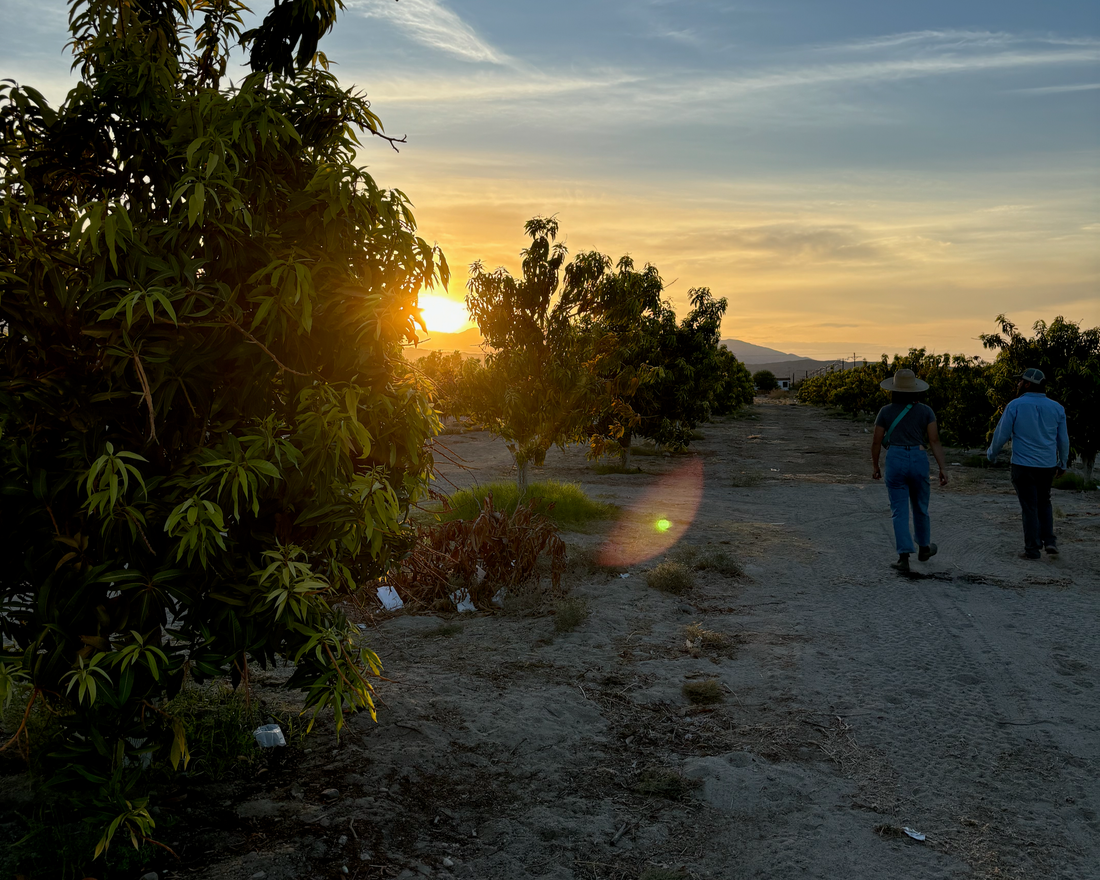Or so we thought, until we met the good folks at Wong Farms. The Wong-Chamberlain family has been farming on a sandy parcel nestled between Joshua Tree and the Salton Sea for three generations. They are growing over a half dozen varieties of mangoes in the desert – tree-ripened, California-grown, and so, so tasty!
Wong Farms is run by brothers Barrett and Jason. Their mom Debbie is theoretically retired, though that word must mean something else on the farm. The first time we visited she was too busy hustling with the harvest crew to chat. Their dad Rod, who Barrett and Jason teasingly refer to as "Big Mango" for his suggestions at commercialization, is also "retired". On Monday, he was picking mangoes in the dawn heat with the crew.
The mango grove was planted by Debbie's father, Ed Wong. Ed grew up farming in Orange County before moving to the desert in the 1970's. He planted the first mangoes in 1997 as an experiment, just a year before he passed. His original planting is now at full maturity, producing some of the mangoes that the Wong-Chamberlain family harvested this week.

Two mangoes, one hidden by a protective paper bag, catching the morning light.
Visit Wong Farms, like we did this week, and you're stunned by the oppressiveness of the climate. When we roll into town the evening before our visit, the car's thermostat says 118. At sunrise the next day, it's 90 degrees. By 9am, it's 100 – which is honestly reasonable given what the daytime high would be. To grow anything in this region in the summer months is audacious. Mangoes? It takes a lot of grit, care, and experimentation.
The Wong-Chamberlain family is growing exceptional mangoes, and that takes a bit more work. The first thing a visitor might notice, after the heat, is the bags. Wong Farms is adamant about tree-ripened mangoes, which is infeasible given the terrain. That intense summer sun reflected off the desert landscape sun-burns the mangoes, causing uneven ripening and dropped fruit. So early in the season, the crew covers each mango with a white paper lunch bag, stapled loosely in place to protect the fruit from the intense desert sun while allowing it room to grow and to ripen to full sweetness and flavor. (We calculated that, just for the mangoes they harvested this week, that's 12,000 bags placed by hand.)
Harvest and handling are key in pursuit of exceptional fruit. Wong Farm's main variety, the Valencia Pride, has soft flesh and a thin skin. Picking a thin-skinned tree-ripe mango requires extra care, which they liken to cradling a giant egg. The crew uses long poles topped with nets to gently harvest them, before they're QC'ed under the exacting standards of farmer-matriarch Deborah. They'll be at market within a couple days – a radically shorter supply chain compared to imported mangoes. Because they're so much closer to market, they're able to let the mango reach full sweetness and flavor on the tree.

A Valencia Pride mango
Crucially, Wong Farms' mangoes are untreated. Virtually all imported mangoes are picked underripe and quickly simmered in a chlorinated hot water bath before being shipped. This treatment, to combat tropical fruit flies, is required by the USDA and it's widely perceived to impact the flavor. It's difficult to say whether it's the treatment or the level of ripeness at harvest that explains why a mango in a supermarket here might fail to live up to the memories or nostalgia of a mango there. Perhaps it's a combination of the two, but something here explains the overwhelming response folks have to Wong Farms' mangoes. They're just on another level!
Experimentation is required when you're growing a tropical fruit in the desert, but here it seems to be the guiding principle. Wong Farms' main crop is the Valencia Pride, a large mango developed in Florida that boasts sweet, custardy flesh and tropical, coconutty flavors. But brothers Barrett and Jason are keen to develop new varieties. Most mango varieties don't have true-to-type seeds, which means that when you plant and grow out a seed, the mangoes produced by that tree won't resemble the parent mango. They're using this a source of creativity, planting hundreds of seeds to see what novel varieties might arise. Considering that it takes five to six years for a mango tree to start producing fruit, and adding the years to propagate and grow out a promising result, this is a remarkably patient form of experimentation. The Golden Lady mangoes we featured last month were the first major success of this project. The Golden Lady is their own variety, and this was the first season that the orchard produced enough volume for them to share.
They are also trialing pineapples, propagated from fruit sourced at local supermarkets, because why not? We see this intrepid spirit mirrored in many of the small growers we work with, quietly working against – or perhaps entirely outside of – conventional wisdom, to delicious results. It's inspiring to see a farm take such care in their work. It's a California reflection of the dedication we saw in Japanese fruit growers when we visited last July.
We're so excited to get to share these very special, tree-ripened California-grown mangoes.





